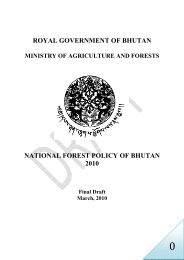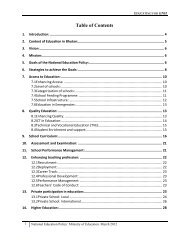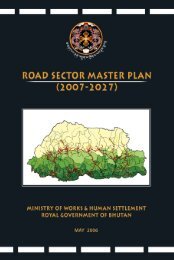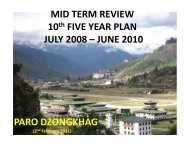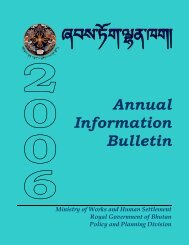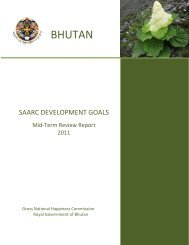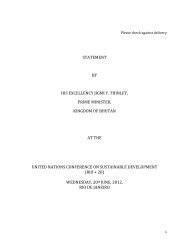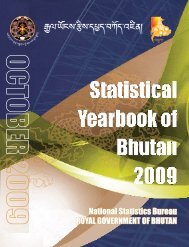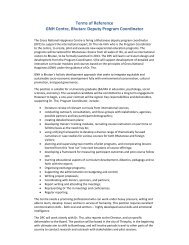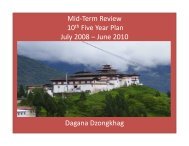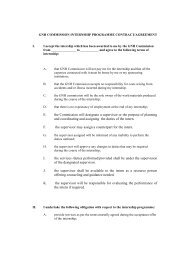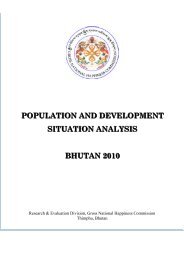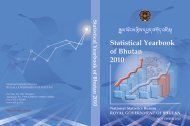COUNTRY BACKGROUND - Gross National Happiness Commission
COUNTRY BACKGROUND - Gross National Happiness Commission
COUNTRY BACKGROUND - Gross National Happiness Commission
You also want an ePaper? Increase the reach of your titles
YUMPU automatically turns print PDFs into web optimized ePapers that Google loves.
Environment and Sustainable Development<br />
2<br />
degradation of less productive land, particularly as this land is likely to be on steeper slopes and more<br />
susceptible to erosion. The need to increase food production may also result in over-utilisation of existing areas<br />
and introduction of environmentally damaging practices such as excessive use of chemical fertilisers.<br />
- As population and incomes increase, the demand for livestock products will rise. Although livestock numbers<br />
have not increased significantly in the past decade, further expansion of the national herd, may lead to<br />
deterioration of grazing resources and reduction in the regenerative capacity of the pastures.<br />
- Although most of the country's original forest cover is still intact, increasing population will place additional<br />
demands on the resource for grazing , fodder and firewood, for non-wood forest products and building<br />
materials. The per capita consumption of fuelwood is among the highest in the world (2.4 cu.m/pa). Until the<br />
late 1970s the commercial logging of wood by sawmills had been indiscriminate and was leading to overexploitation<br />
in some areas. To address this problem the RGOB nationalised logging activities and substantially<br />
reduced the annual cut. However the scale of the problem is insignificant as shown by recent studies of the<br />
temperate and subtropical zones which revealed that the annual loss of forest cover is between 0.30% and<br />
0.33%. over a 10 year period (1978-88).<br />
- The construction of the road network may have caused severe erosion in some areas. In such a geologically<br />
unstable environment, further road construction is likely to cause additional erosion problems. The provision<br />
of additional road infrastructure will also open new areas for development, where environmental problems<br />
may occur if not properly planned.<br />
- The planned development of industrial and mining sectors may result in environmental damage and pollution.<br />
The scale of the problem is small at present, largely because these sectors are undeveloped.<br />
- The rapid expansion of urban areas and human settlements has not been based on sufficient planning and<br />
development of sanitation, drainage and waste disposal infrastructure, and this is resulting in public health<br />
problems in some areas.<br />
4.6 While there is concern that these problems may arise, the RGOB recognises that there has been little research<br />
into these issues or even baseline data from which to determine the nature and extent of environmental problems in<br />
Bhutan. It is important to recognise that these trends may not occur as feared, or that different forms of<br />
environmental degradation may be taking place, and therefore avoid inappropriate responses to presumed<br />
environmental concerns, which may in themselves be damaging to the environment or hamper economic growth.<br />
This may be the result of, in the absence of detailed data, assuming that the environmental degradation occurring in<br />
neighbouring countries will be repeated in Bhutan, without examining the situation more closely. There is also<br />
insufficient understanding of the impact of the development process on the environment.<br />
III. Sustainable Development in BhutanIII. Sustainable Development in Bhutan<br />
4.7 Bhutan's approach to sustainable development was articulated in the Paro Declaration of 1990:<br />
" The key is to find a development path that will allow the country to meet the pressing needs of the people,<br />
particularly in terms of food, health care and education, without undermining the resource base of the<br />
economy. New industries, new agricultural markets, and new forestry products need to be carefully<br />
developed, with respect to their broader environmental ramifications...Sustainable development, we believe,<br />
is a concept that is in harmony with the cultural and religious traditions of Bhutan. Our nation already has a<br />
strong conservation ethic, and indeed, respect for the natural world is a central tenet of Buddhism. It is<br />
therefore essential that the traditional culture be kept strong so that its values can guide our sustainable<br />
development path."<br />
4.8 The RGOB recognises that it is not necessary to restrict economic growth to ensure preservation of the<br />
resource base, but that utilisation of resources in a carefully managed manner, will provide sufficient incentives to<br />
ensure that natural resources are not depleted. To achieve the sustainability of resource utilisation, it is necessary to<br />
monitor the impact of development on the environment and to provide the necessary controls, regulations and<br />
incentives to the private sector.



